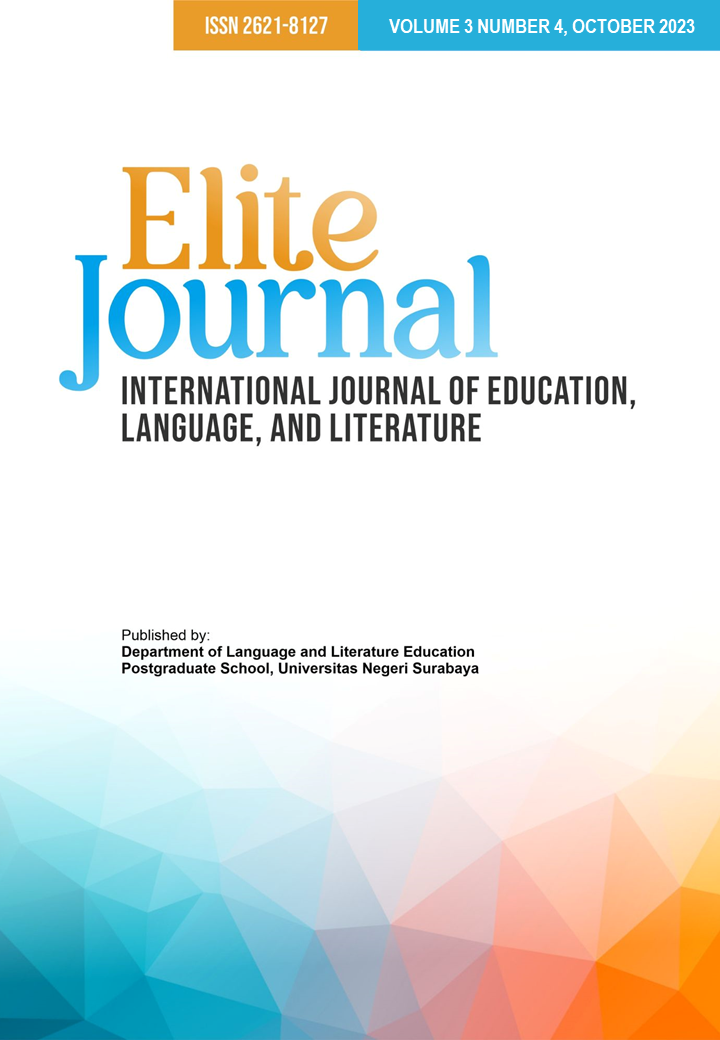TRACING THE LEGACY: COMPARING MARY SHELLEY’S FRANKENSTEIN TO JENNIFER MCMAHON’S THE CHILDREN ON THE HILL
DOI:
https://doi.org/10.26740/elitejournal.v3n4.p1-6Keywords:
monster, revenge, source, inspiration, compare and contrastAbstract
Mary Shelley’s Frankenstein has become a prominent predecessor for abundant adaptations in popular culture. Although the novel was published more than two hundred years ago, numerous writers have made it their most reference and inspiration. This article aims to investigate the traces Frankenstein has left on Jennifer McMahon’s The Children on the Hill under the argument that the former has served as the source for the latter. Therefore, this research belongs to the literary influence study. Drawing the analysis under the compare and contrast method, this study results in some parts of Frankenstein that are recreated in The Children on the Hill. Those parts include the description of the creator’s life, the trigger of the creation, the creation’s process, and its horrible consequences. The result also shows that McMahon’s book presents the recreated parts in a more horrifying way, especially about the details of the experiment and the shocking ending when the monster kidnaps many female adolescents to turn them into monsters like her. This study concludes that a monster does not always come in a hideous appearance like what Victor created. However, the monster can also lie dormant within a human’s personality, which can bring about terrible destruction when it comes out.
References
Crook, N. (2018). Foreword. In C. M. Davison & M. Mulvey-Roberts (Eds.), Global Frankenstein. Palgrave Macmillan.
Daryl, M. (2022). Interview with an author: Jennifer McMahon. Los Angeles Public Library. https://www.lapl.org/collections-resources/blogs/lapl/interview-author-jennifer-mcmahon
Ghazi, M. R. (2023). The Frankenstein network: A study of transtextuality in selected postmodernist novels [University of Baghdad]. https://doi.org/10.13140/RG.2.2.10472.44806
Jost, F. (1974). Introduction to comparative literature. Pegasus.
Lisica, F. (2022). Frankenstein. In V. P. Gl?veanu (Ed.), The Palgrave Encyclopedia of the Possible. Palgrave Macmillan. https://link.springer.com/referencework/10.1007/978-3-030-90913-0
McCormack-Clark, J. (2022). The Frankenstein myth echoes of Frankenstein, technological anxieties, and the monstrous posthuman in twenty-first century science fiction film. Auckland University of Technology.
McMahon, J. (2021). The children on the hill. Scout Press.
Shelley, M. (2017). Frankenstein: Annotated for scientists, engineers, and creators of all kinds (D. H. Guston, E. Finn, & J. S. Robert (eds.)). The MIT Press.
Downloads
Published
How to Cite
Issue
Section
License
Copyright (c) 2023 Sufi Ikrima Sa'adah, Maulidya Rochmah, Ramadhina Ulfa Nuristama

This work is licensed under a Creative Commons Attribution 4.0 International License.
 Abstract views: 340
,
Abstract views: 340
, PDF Downloads: 306
PDF Downloads: 306





